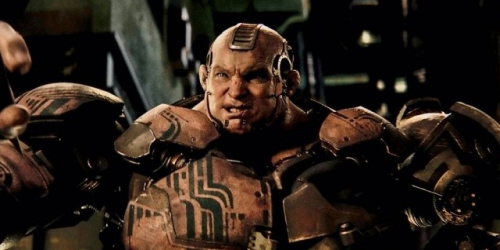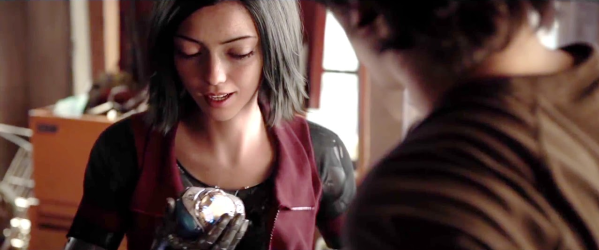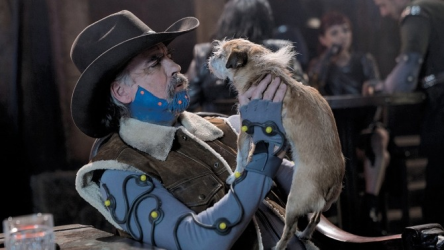My interest in seeing this film was less than zero and less than Less Than Zero—the grimy and unlikely screen version of Brett Easton Ellis’ novel with Andrew McCarthy, Jami Gertz and Robert Downey, Jr. I mean, the poster presents the most generic-looking CGI manga-inspired female action hero with freaky-big eyes doing fighty stuff in a blandly porridge-y 2019 way. And the fact that it was directed by Robert Rodriguez (when I discovered that) made it even worse to my mind: Rodriguez is often cheesy, but seldom bland.

Say what you will about this “Spy Kids” makeup, it’s not bland.
Item the first: Weird critical/audience split. Rotten Tomatoes having gone completely into shill territory with Captain Marvel, I’m tentatively trying out Metacritic, but both show “Critics hate it, audiences like or love it.” OK, well, audiences a lot of time like bland action schlock so that’s not super strong—but the split was, at the time, over 30 points, which puts it in the territory of a film containing positive references to Jesus.
Item the second: Word of mouth is consistent and insistent. People like this movie, and fairly insistent that the CGI does not hit you with the uncanny valley effect.
Enough people on the movie thread and Twitter recommended it to me where I decided to take the plunge. The Flower was out, of course, since her taste falls to classics and movies of spiritual interest. The Boy was okay about it, but the way he picked his girlfriend over any actual showing of the film (and who could blame him), I realized it was one of those movies I would never get to if I waited for him. The Barbarienne is up for whatever, usually, but she was against it due to changes made from the manga (which she has not read, but the Internet will happily and angrily inform her of).
So, I, a father of four went alone to Alita: Battle Angel, which probably gets me on an FBI list, or should, anyway.

“My daughter, beware most of all of men who like your manga.”
Irony of ironies: This is basically a YA movie in the vein of Hunger Games or The Giver which, as yaboi Zack points out, probably would’ve felt a lot fresher 25 years ago when it actually ended it’s 5 year manga run. That said, I ended up liking it overall, and it’s definitely worthy of an examination for what it does right.
The story is this: In a dystopic (of course) future world, the peons live on the ground in subservience to the floating sky city Zalem—the last floating city since a war 300 years previous which resulted in all the other floating cities collapsing. Zalem takes the goods that Iron City produces through these giant tubes that look like they’re tethering the thing down, and then dumps its trash out of a big hole in the middle around which the city is congregated. A kind-hearted cyborg repair doctor discovers the remnants of a cyborg in the dump with a still functioning heart and brain, and takes it home to put it in a mechanical body he had made for his own daughter years before.
When she wakes up, she has no memory (natch), and struggles (a little) to adapt to her new surroundings while dealing with flashes of memory and bouts of super-combat-skills. Then we get bounty hunters (good and bad), serial killers, a game called roller—er, motorball, the winner of which supposedly gets to go to Zalem, roving gangs of punks stealing cyborg attachments, a love story, betrayals, an ex-wife redemption arc, interplanetary war backstory, Jeff Fahey with a team of robot dogs, gratuitous Edward Norton and Michelle Rodriguez, and the specifically allowed one instance of the F-word for PG-13 movies.

Jackie Earle Haley trained for six months to bulk up for this role!
There’s a lot of story, is what I’m getting at, and I’m sure I’ve left some major points out, as did (wisely) Rodriguez when he trimmed down James Cameron’s script to two hours. Honestly, all that stuff and the story arc is as generic as you’d expect a 30-year-old story from an increasingly over-mined genre to be.
But from go, the filmmakers invest in Alita as a teenage girl. There’s no “is she human or not?” nonsense. She is. She has normal teen reactions despite her brain having been in a junkyard for 300 years. She’s unsure, excitable, emotional, effusive, enthusiastic and quick to jump to the wrong conclusions. And she has freakishly large eyes.
The funny thing is, the eyes largely works to keep you out of the uncanny valley. For me, I know it didn’t completely work because I kept thinking about it—but it worked better than most CGI humanoids. And I think it’s because the big eyes tell your brain that there’s no effort to actually fool you. Meanwhile there are a lot of imperfections and human touches, along with some very good motion capture and voice acting by Rosa Salazar which makes for a compelling heroine.

At one point, she literally gives her boyfriend her heart.
Chris Waltz is great and does the main emotional heavy lifting apart from Salazar, and their father-daughter dynamic gives you something to really care about. Jennifer Connelly has a less well-developed maternal role to play, but she works it well. Keean Johnson threads the needle as the guy who’s smitten with a girl who can tear him limb-from-limb. In fact, all the characters are nicely drawn, probably because they were developed over six books. Jeff Fahey as the dog-themed bounty hunter and Jackie Earle Haley as the biggest baddie were inspired choices for cool characters.
You can tell that there’s a lot more story behind most of the characters. Besides Connelly, The Iron City boss played by Mahershala Ali and quite a few of the bounty hunters would’ve benefitted from more screen time. But I sincerely, deeply appreciated Rodriguez keeping this tight and giving us an ending that doesn’t feel like a middle finger. It doesn’t tie up all the loose ends, but it’s satisfying enough to not make you feel ripped off.
There are a few hiccups. Sometimes the actors aren’t looking in quite the right place when interacting with Alita, e.g., and occasionally the seams on the CGI show, which didn’t bother me because I feel like Rodriguez (like a lot of Asian filmmakers) is less interested in “looks real” than “looks cool”. (On the other hand, my understanding is this film cost somewhere between $175-$200M, and Cameron’s all about the “real”, but hey, not my money.) Rodriguez also really knows space, which means even his goofiest CGI-tacular affairs tend not to be disorienting, and in this case imbues Iron City with life you didn’t feel in (e.g.) Coruscant. The too-much-for-me-CGI of the motorball game is salvaged by a good sense of space and weight.
So, if you’re like me and have only heard enthusiastic things about this, I’ll temper that somewhat. I liked it, there was much to commend, and I had good feelings about it—but unless you’re in that demo, it’s probably not going to knock your socks off.

Jeff Fahey celebrates National Puppy Day.

Interestingly, I did want to see this, even though people that I think have awful taste liked it.
I’d be interested to hear your take on it. As time passes I’m more inclined to think of this as “a movie I didn’t hate” more than one I liked.